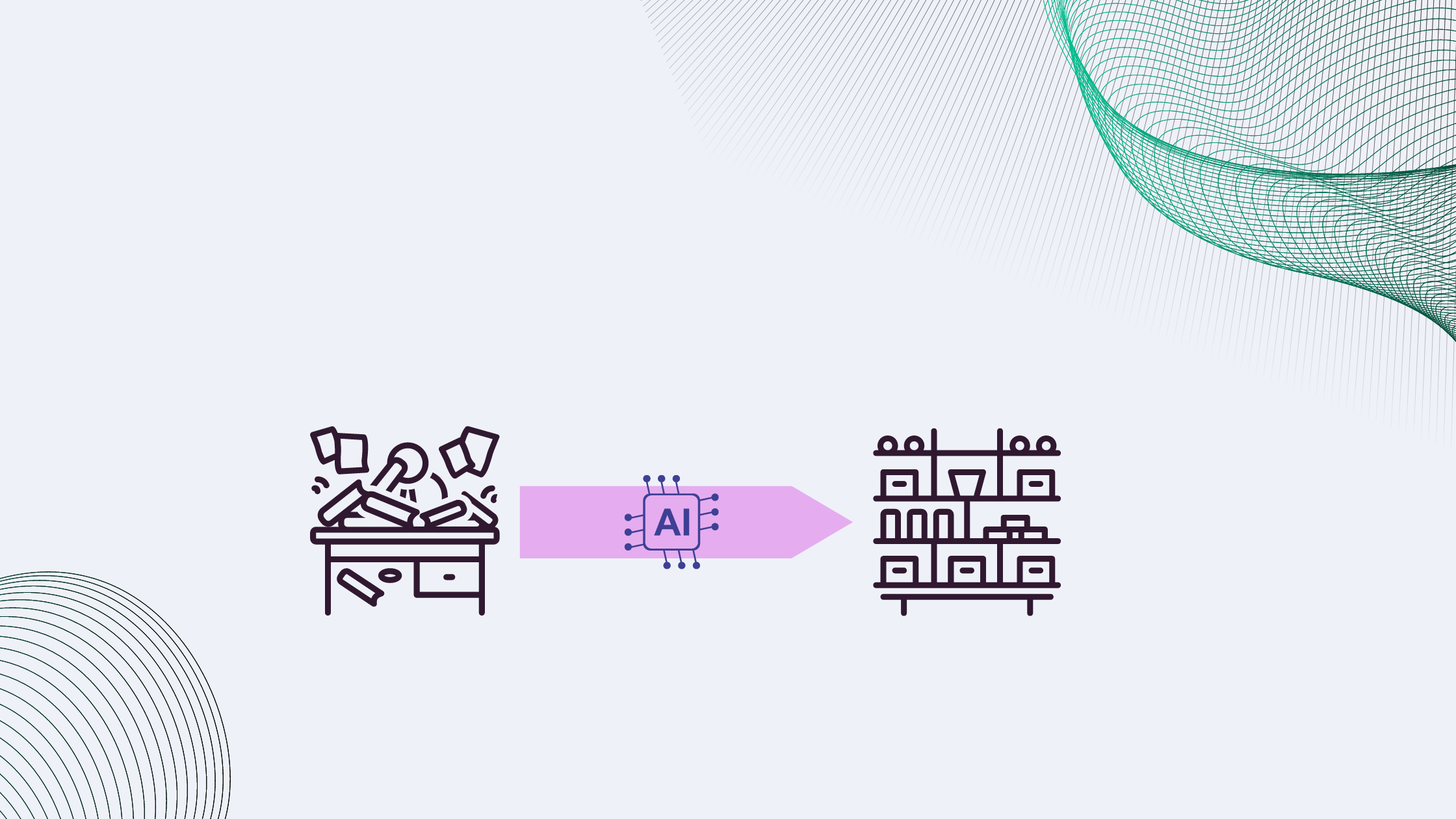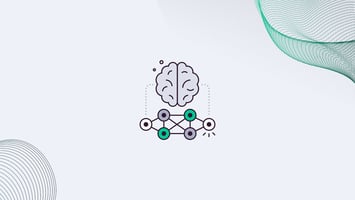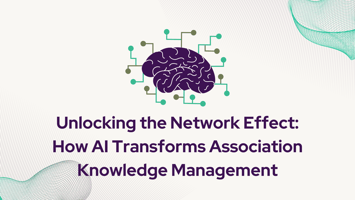Associations have always been the stewards of industry knowledge—housing decades, even centuries,...
Breaking the Vicious Cycle: How AI Transforms Knowledge Management for Associations
The Value of Knowledge in Associations
At the core of every successful association lies a fundamental commitment to creating and sharing knowledge. This knowledge takes many forms, from industry research and best practice guides to educational resources and networking events. By aggregating and distributing these valuable insights, associations empower their members to stay informed, connected, and competitive in an ever-changing landscape. The value that associations provide is directly proportional to the quality and relevance of the knowledge they create and share. In other words, the more an association invests in developing and delivering valuable insights, the more its members will benefit, and the stronger the organization will become.
In essence, associations serve as knowledge hubs for their respective industries or professions. They bring together experts and practitioners from diverse backgrounds and provide a platform for them to exchange ideas, share experiences, and collaborate on solutions to common challenges. Through this process of collective learning and discovery, associations help to advance the state of knowledge in their fields and drive innovation and progress.
Moreover, associations play a crucial role in curating and contextualizing knowledge for their members. In a world where information is abundant but attention is scarce, associations help their members cut through the noise and focus on the insights that matter most. By carefully selecting, organizing, and presenting knowledge in ways that are relevant and actionable, associations enable their members to make better decisions, improve their skills, and achieve their goals more efficiently and effectively.
The Exponential Complexity of Knowledge Management
However, as associations continue to generate more and more knowledge, they face a growing challenge: the exponential complexity of managing and accessing that knowledge effectively. This challenge arises from the inherent nature of knowledge creation and accumulation. Each new piece of content added to an association's knowledge base, while valuable in its own right, also contributes to the overall complexity of the system.
To illustrate this, imagine an association's knowledge base as a vast library, with each new knowledge asset representing a new book added to the shelves. At first, when the library is small, it's relatively easy to find the book you need. You can browse the shelves, use a simple cataloging system, or even just ask the librarian for help. But as the library grows larger and larger, with thousands upon thousands of books, the task of finding a specific piece of information becomes increasingly daunting.
The same principle applies to an association's knowledge base. With each new article, webinar recording, research report, or discussion forum thread, the total volume of knowledge increases, making it harder for members to navigate and find what they need. The problem is compounded by the fact that knowledge assets are often interconnected and interdependent, with complex webs of references, citations, and related concepts. This means that even if a member finds a relevant piece of information, they may still need to trace multiple links and connections to fully understand its context and implications.
Traditional methods of organizing and retrieving knowledge, such as hierarchical taxonomies and keyword searches, quickly become overwhelmed by the sheer volume and diversity of the content available. These methods rely on predefined categories and labels, which can be difficult to apply consistently and comprehensively across a large and varied knowledge base. This approach also puts pressure on the members to know the taxonomy and correct keywords before even attempting to find the knowledge they need.
Moreover, they often fail to capture the nuances and contextual relationships between different pieces of information, making it harder for members to find the specific insights they need. As a result, members often find themselves spending more time searching for answers than actually applying the knowledge they seek. Over time, this can lead to frustration, disengagement, and a sense that the association's knowledge base is more of a hindrance than a help.
The Catch-22 of Knowledge Creation and Sharing
This brings us to the heart of the problem: a catch-22 that threatens to undermine the very value that associations work so hard to create. On one hand, associations are driven by a mission to generate and share knowledge, which is the primary source of their value to members. The more valuable the knowledge they provide, the more their members will benefit, and the more the association will thrive. On the other hand, the act of creating and sharing knowledge inevitably leads to a more complex and difficult-to-navigate knowledge base, which can hinder members' ability to access and use that knowledge effectively.
In other words, while the amount of value an association creates increases linearly with each new piece of content, the complexity of discovering and using that value grows exponentially.
This means that, at a certain point, the marginal value of each additional knowledge asset begins to diminish, as the effort needed to find and apply that knowledge outpaces the benefits it provides. Over time, this can lead to a paradoxical situation where an association's knowledge base becomes so vast and unwieldy that it actually detracts from the organization's overall value proposition.
The AI-Powered Knowledge Assistant
This is where AI comes into play. AI has the potential to revolutionize the way associations manage and share knowledge, by serving as a powerful knowledge concierge for their members. Rather than relying on static taxonomies, website layouts, or search functions, members can simply approach the AI assistant and describe what they need using plain, natural language. The AI concierge then takes on the task of trawling the association's vast knowledge base, uncovering the most relevant and useful information to address the member's specific needs.
An AI assistant goes beyond just retrieving knowledge assets – it actively works to interpret and apply that knowledge in ways that are tailored to each individual member. By analyzing the context and intent behind a member's query, the AI can draw connections and insights that might otherwise go unnoticed, and present the information in a clear, actionable format. And with each interaction, a well-built AI system learns and adapts, continuously refining its understanding of members' needs and preferences to deliver increasingly personalized and proactive support.
This AI-powered approach has the potential to greatly deepen member engagement with the association's knowledge base. With a knowledgeable and responsive AI concierge at their fingertips, members are more likely to explore the full breadth and depth of the association's knowledge assets. They may ask follow-up questions, seek clarification on complex topics, or even pose questions they might never have thought to ask otherwise. This increased engagement not only helps members extract more value from the association's existing knowledge but also generates new insights and knowledge through the power of collective intelligence.
By facilitating deeper, more dynamic interactions between members and the association's knowledge base, AI can help to create a new cycle of knowledge creation and sharing. As members engage more actively with the AI concierge, the system can capture valuable data and insights about their needs, interests, and knowledge gaps. The association can then use this information to inform its content creation and knowledge management strategies, ensuring that it is always one step ahead in providing the most relevant and valuable knowledge to its members.
In essence, AI removes the barriers to knowledge access and transforms an association's knowledge base from a static repository of information into a dynamic, interactive tool for learning, discovery, and growth. And just like that, the vicious cycle of knowledge complexity transforms into a virtuous cycle of knowledge creation, discovery, and application.
To truly thrive in the digital age, associations must embrace the transformative potential of AI and other emerging technologies, using them to break free from the catch-22 of knowledge management and unlock the full value of their knowledge assets.
This is precisely what Betty Bot aims to achieve. As an AI-powered knowledge assistant designed specifically for associations, Betty Bot embodies the principles and potential described in this post. By serving as a tireless and knowledgeable concierge, Betty Bot helps association members navigate even the most complex and extensive knowledge bases with ease, using intuitive conversational interfaces to guide users to the most relevant and valuable information for their needs.
If you're ready to unlock the full potential of your association's knowledge assets and solve the challenges of knowledge management, we invite you to learn more about Betty Bot. Book a demo today and discover how Betty Bot can transform your association's knowledge base into a dynamic, interactive tool for learning, discovery, and growth.
.png?width=173&height=70&name=Betty_RGB%201%20(1).png)



